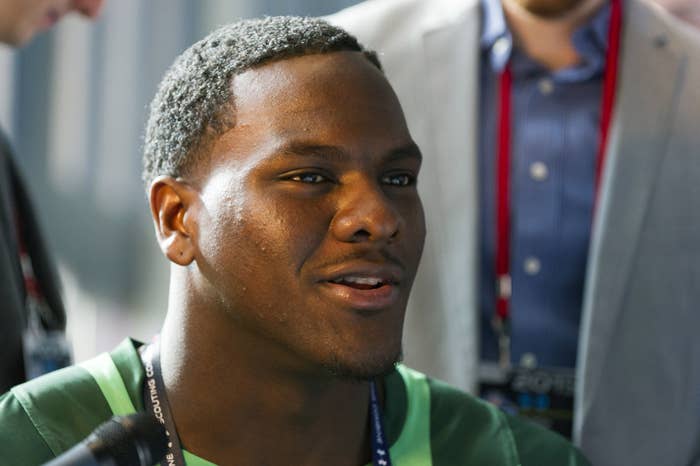Over the weekend, the Seattle Seahawks used their first pick in the NFL Draft to select defensive end Frank Clark out of Michigan.

In November 2014, Clark was arrested for allegedly assaulting his then-girlfriend, Diamond Hurt, at a hotel in Ohio.
Clark was originally charged with two misdemeanors for domestic violence and assault, though prosecutors told BuzzFeed News that he recently took a deal to plead guilty to persistent disorderly conduct, a lesser charge. He was sentenced to a $250 fine and the two days he already served in prison.
According to a police report from the arrest in November, Clark and Hurt began arguing and she threw a television remote control at him then biting him when he tried to hold her down on the bed. Clark allegedly responded by punching her in the face.
Photos of Clark included in the police report show a laceration on his nose that appears consistent with Hurt's report that she bit him. Photos of Hurt show her blood-streaked face and the early signs of bruising on her neck.
The NFL has been scrambling to address and properly punish players who have been accused – and convicted – of violence against women, and that includes taking steps to interview people who were victims of or witnessed such incidents. And Seahawks coach Pete Carroll even starred in the league's publicly released presentation on violence against women that all players, personnel, and incoming rookies were required to watch.
But the report by the Seattle Times said the Seahawks failed to speak to two witnesses, Lis Babson and Kristie Colie. They who spoke with the newspaper about the night at the hotel:
[T]hey heard loud banging, yelling and screaming coming from Clark's room. Babson says she immediately sensed something was terribly wrong, ran outside and pounded on the door until Clark opened it.
Babson says she immediately sensed something was terribly wrong, ran outside and pounded on the door until Clark opened it.
In an interview with The Seattle Times on Monday, Babson said an enraged Clark tried to quickly slam the door in her face, but she caught it before it could close.
Colie, who had followed Babson into the hallway, said the woman on the floor inside the room "was definitely beat up" and initially didn't move.
"She looked unconscious,'' Colie said. "She looked like she was knocked out, and then she started to move slowly.''
Hurt's brother, who was in the room at the time of the alleged assault, told police Clark "grabbed her by the throat, picked her up off the ground and slammed her to the ground while also landing on top of her.''
In a statement to reporters after the draft, Seahawks GM John Schneider claimed they properly vetted Clark's background before drafting him:
Our organization has an in-depth understanding of Frank Clark's situation and background. We have done a ton of research on this young man. There hasn't been one player in this draft that we have spent more time researching and scrutinizing more than Frank. That's why we have provided Frank with this opportunity and are looking forward to him succeeding in our culture here in Seattle.
However, the Seahawks told the Seattle Times they did not "speak directly to any witnesses from that night.''
The Times also reported that the Perkins Township Police Department didn't contact the two witnesses after they gave their initial statements.
The details revealed by the Times' report echo another curiously conducted vetting process of another NFL rookie: The Tampa Bay Buccaneers allegedly interviewed 75 people to determine quarterback Jameis Winston's character before drafting him first overall, but did not interview Erica Kinsman, who accused him of raping her in 2012.
When pressed by Sports Illustrated's Peter King about this detail, Buccaneers GM Jason Licht said:
"We are not talking about this now… but we read the depositions. We knew what she was going to say. This was a thorough investigation."
In a column published the day before the Seattle Times released their report, espnW's Jane McManus pointed at the inconsistencies between the NFL's new initiatives to investigate and punish players accused of violence against women and how individual teams are handling individual players:
The teams seem to be at odds with the league on this. The NFL wants to be seen as a leader on this issue, but teams still want to win and women are still seen through the gaze of suspicion.
The NFL has hired people like investigator Lisa Friel and Vice President of Social Responsibility Anna Isaacson to serve as voices from outside the bubble and break down the insulated thinking that brought the league so much criticism after a two-game suspension for [Ray] Rice. But individual teams don't have many women involved in the scouting and vetting process.
